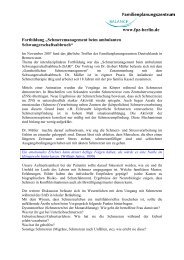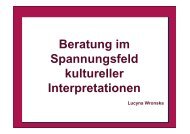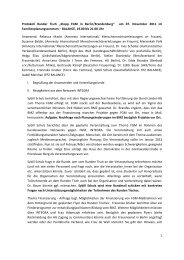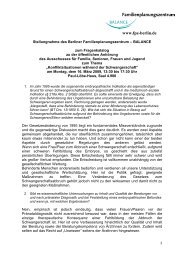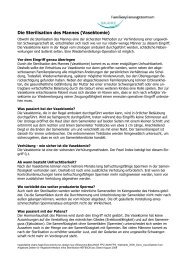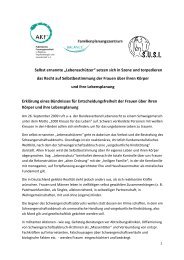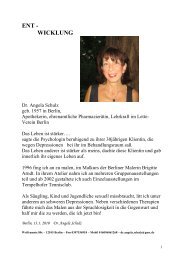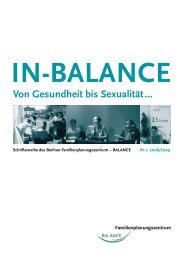Listening to African Voices - FPZ
Listening to African Voices - FPZ
Listening to African Voices - FPZ
Create successful ePaper yourself
Turn your PDF publications into a flip-book with our unique Google optimized e-Paper software.
higher than the prevalence rate for the country. Furthermore,we identified several girl children who had either undergoneFGM/C or were at risk of being subjected <strong>to</strong> the practice.There is a great need <strong>to</strong> identify persons in favour of theabolition of FGM/C among immigrants from the North whoare motivated <strong>to</strong> raise awareness among their people.6.6.10. EthiopiaThe Ethiopian community members interviewed had relativelyhigh levels of education and integration. The findings indicatedthat Ethiopians showed a strong willingness <strong>to</strong> leavethe tradition of FGM/C behind in the context of migration.Although many of the adult women have undergone FGM/C– mostly during infancy – in Ethiopia, they don’t have anyinterest in subjecting their daughters growing up in Germany<strong>to</strong> the practice. A religious leader made the following statementwhich summarises suitably the findings of this study:“If we speak of the parents, I think most of them mighthave gone through the practice themselves. But I don’tthink that they are in favour of FGM being practiced ontheir daughters. I have never ever heard of an Ethiopianhere or anywhere in Germany who let their daughter becircumcised. Of course, I recently heard a report throughthe Deutsche Welle that a certain Ethiopian family wasintending <strong>to</strong> go home <strong>to</strong> circumcise their daughter. Andit was proved <strong>to</strong> be a false accusation. So my conclusionis that Ethiopians living in Hamburg are not in favour ofFGM and don’t want <strong>to</strong> see it practiced on their daughters.But that doesn’t mean that the parents are notcircumcised. I am sure a lot of them were circumcisedwhile they were babies. (39-year-old religious leader andkey informant of Ethiopian origin)6.6.11. Burkina FasoGirls and women arriving in Hamburg from Burkina Faso arelikely <strong>to</strong> have undergone FGM/C. The immigrant communityof Burkina Faso is relatively well aware of the risks and consequencesof FGM/C and the greater part speaks out for theabandonment of the practice. It is not of importance <strong>to</strong> them<strong>to</strong> maintain the tradition of FGM/C while living in Germany.One of the researchers of Burkinabe origin concluded, “Itwould not even cross their minds; they have other issues <strong>to</strong>deal with.” Nonetheless, there is a minority of men who arguesfirmly for the need <strong>to</strong> continue FGM/C so as <strong>to</strong> preventBurkinabe women from becoming promiscuous.6.6.12. GuineaThe <strong>to</strong>pic of FGM/C is very difficult <strong>to</strong> address with membersof the Guinean community. Most of the participantsexpressed either indifference or strong negative reactionswhen asked about their perceptions of FGM/C. Althoughthe greater part said that they wanted the practice <strong>to</strong> bes<strong>to</strong>pped, there were no strong voices advocating particularactions. The findings indicated that almost all Guineanwomen in Hamburg had undergone FGM/C. Among thedaughters of the parents interviewed, 15 girls had alreadyundergone FGM/C in Guinea and five girls were estimated<strong>to</strong> be at risk of being subjected <strong>to</strong> the practice in the future.The number of Guinean girl children living in Hamburgseems <strong>to</strong> be considerably higher than the 10 girls officiallyregistered.6.6.13. SenegalThe interviewed sample was <strong>to</strong>o small <strong>to</strong> draw conclusionsabout the Senegalese community in Hamburg. Thedata indicates that a solid proportion of the immigrants isfrom practicing families for whom FGM/C is a cultural andsometimes religious practice that initiates the women in<strong>to</strong>the adult society of their ethnic group. Further research isrecommended <strong>to</strong> establish a more representative assessmen<strong>to</strong>f the Senegalese immigrant community.6.6.14. NigerThe immigrant population of Niger is very small and veryfew participants have roots in practicing groups. There wereno indica<strong>to</strong>rs for women and girls concerned, although theexistence of isolated cases cannot be excluded.6.6.15. MaliThe findings reveal that there is a small but significant proportionof conservative traditionalists in the Malian immigrantcommunity who consider FGM/C <strong>to</strong> be a tradition <strong>to</strong>preserve. Most women immigrants from Mali have undergoneFGM/C. There is no evidence, however, that supportersof the practice would go as far as <strong>to</strong> subject their daughtersgrowing up in Germany <strong>to</strong> FGM/C. Further studies are recommended<strong>to</strong> explore the practices of the Malian immigrantcommunity regarding FGM/C in Hamburg.6.6.16. Sierra Leone, Liberia and Guinea BissauWe only reached a handful of immigrants from Sierra Leone,Liberia and Guinea Bissau. As the prevalence rates of thethree countries are moderate <strong>to</strong> high, we recommend conductingfurther research with the immigrant communities ofthese three countries.6.6.17. TanzaniaThere are only 42 Tanzanians registered in Hamburg. Gatheringdata from such a small community is methodologically<strong>Listening</strong> <strong>to</strong> <strong>African</strong> <strong>Voices</strong> 93






